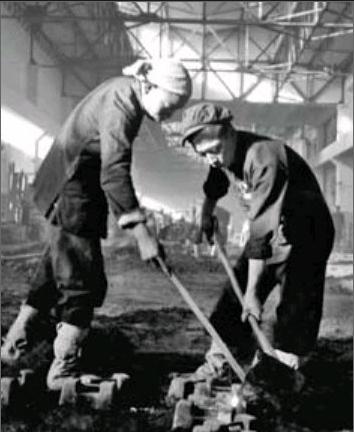Pushing for Rural-Urban Equality
2014-11-24byZiMo
by+Zi+Mo


A framework document recently unveiled by the State Council of China will put an end to the dual household registration (or hukou) system that has divided the nations population into rural and urban residents for more than half a century. On July 30, 2014, the State Council issued Opinions on Further Promotion of the Reform of Household Registration System, according to which urban and rural residents will no longer differ from one another.
Equal Benefits
According to Opinions, China will completely lift restrictions on hukou in administrative towns and small cities and relax restrictions on hukou in medium-sized cities step-by-step, and large cities with populations between 1 and 5 million will be allowed to set reasonable thresholds. Meanwhile, China will continue to control the population of mega-cities with more than 5 million residents. The ultimate goal of household registration system reform is equal public services and welfare, such as education, employment, pension, medical care, and housing, for all residents.
Although hukou restrictions in large and mega-cities have yet to completely be removed, the issuance of the document is still a watershed moment. Duan Chengrong, vice dean of the School of Sociology and Population Studies at Renmin University of China, notes that this round of hukou system reform will radically eliminate rural-urban discrimination and resume the basic function of household registration, and that rural residents will enjoy equal benefits with urban residents, thus ending dual policies for public services.
Of course, the reform of the household registration system faces many challenges. First and foremost, it is costly. According to the Urbanization Blue Book 2013 released by the Chinese Academy of Social Sciences (CASS), the per capita cost to transform migrants from rural into urban residents is about 131,000 yuan. That means if the country achieves the goal of moving 390 million rural residents to cities by 2030, the Chinese government will spend 51.1 trillion yuan (US$ 8.3 trillion), a tremendous fiscal burden for any country. Removing the distinction between urban and rural hukou is not a fundamen- tal solution, but only the beginning. The move requires formulation of relevant supplementary policies. Zhang Yi, deputy director of the Institute of Sociology under CASS, points out in an essay: “How can we guarantee rural residents still enjoy their land tenancy rights after they settle in cities? Can rural residents change their hukou back to rural after they register in cities? Solutions to these questions should be included to relevant laws when they are revised.”
Household Registration Barriers
In fact, there were no barriers on population migration between rural and urban areas in the early years of the Peoples Republic of China. Migrants from countryside who could support themselves were permitted to register their residence permanently in cities.
For the purpose of maintaining social order, however, China began to adopt strict hukou regulations in the 1950s. In 1953, the country conducted its first population census during voter registration to elect deputies to the first National Peoples Congress (NPC). Then, in January 1958, China adopted the Household Registration Regulations, which strictly limited migration from rural to urban areas and between urban areas.
In 1963, Chinas Ministry of Public Security divided residents into “agricultural hukou” and “non-agricultural hukou”according to whether they enjoyed the state-allocated “commodity grain,” which marked the official formation of ruralurban dichotomy in household registration.In an era of extreme scarcity, the social benefits one could enjoy were linked with his or her hukou classification. According to Yu Jianming, an associate researcher at the Policy Research Center of the Ministry of Civil Affairs, those with an urban hukou enjoyed better benefits in terms of food supply, medical care, and education, which led to a widening gap between rural and urban areas.
In the 1980s, with Chinas reform and opening-up, cities demand for labor increased. In this context, previously strict hukou regulations began to loosen. In 1984, the State Council issued Notice on Issues about Rural Residents Applying for Urban Hukou, a milestone document that legalized rural migrants living in cities.
Increasing numbers of migrant workers have swarmed into cities including Beijing, Shanghai, Shenzhen, and Guangzhou from rural areas since the late 1980s. Due to a lack of an urban hukou, they find it difficult to obtain medical insurance like urban residents and enroll their children in urban schools. “Today, many migrant workers have actually settled in cities and wont return to their rural homes,” remarks Yu Jianming. “The education of their children and the protection of their rights in the workplace have aroused wide concern.” All of these are attributed to the current ruralurban hukou dichotomy. For this reason, voices calling for hukou system reform are becoming louder and louder in China.
Top-level Design
In 2011, Hu Jintao, then Chinese president, said during the NPC annual session:“Some migrant workers have left their hometowns and worked in cities for many years. Actually, they have become part of the cities where they work. The central government is discussing and formulating documents on reform of the household registration system and will take effective measures to grant urban hukou to migrant workers who are qualified under certain conditions.”
Starting in 2011, some provinces began to make attempts to reform the household registration system. Cities including Guangzhou, Shenzhen, Zhuhai, Dongguan, Zhongshan, and Foshan adopted the policy of granting migrants an urban hukou if they amassed certain scores when calculating educational level, age, social insurance, tax payments, and housing conditions. However, the overwhelming majority of migrant workers from rural areas had little hope of reaching the required score.
The reform of household registration system finally saw substantial progress this year. At the 2014 NPC annual session, Chinese Premier Li Keqiang pointed out in the Government Work Report that China “will grant urban residency in an orderly manner to rural people who have moved to cities.”The Opinions on Further Promotion of the Reform of Household Registration System released by the State Council confirms the guideline of integrating both rural and urban hukou. Although a series of problems wait ahead, the move will definitely promote social fairness.
According to Ma Xiaohe, vice president of the Academy of Macroeconomic Research under National Development and Reform Commission of China, the guidelines on household registration reform recently released by the State Council mark a giant leap towards the goal of eliminating the rural-urban gap. “To some extent, this move facilitates social mobility, so as to restructure the country into an olive-shaped society with the middle-class at the heart.”
